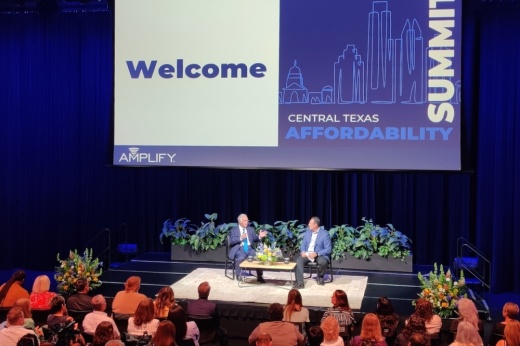What happened
Amplify Credit Union’s first Central Texas Affordability Summit at the Highland media center featured Austin Mayor Kirk Watson and several community leaders for panel discussions about the area’s rising cost of living; its effect on the local workforce; and how businesses, governments and other entities can address the issue.
“There is a fundamental disconnect between median household income and median home price,” Amplify CEO Kendall Garrison said. “And that’s the thing that really makes Austin unaffordable for so many people that aren’t high-income earners. You just can’t afford to live in Austin anymore or even in Travis County.”
Event panelists included Watson; Lourdes Zuniga, Financial Health Pathways executive director; Joana Ortiz, Austin Young Chamber president and CEO; and Workforce Solutions Capital Area CEO Tamara Atkinson.
What they're saying
Following last year’s run for the mayor's office with a focus on affordability, Watson laid out several priorities he said he aims to pursue or that are already in the works at City Hall to respond. First among those are changes underway at the Austin Development Services Department, which handles the administrative side of new construction in town.
Since interim City Manager Jesús Garza’s appointment earlier this year, Austin’s housing and planning offices have seen a few shakeups on the staffing side. Watson, who campaigned on improving basic city services, including on the development side, said Austin is still a hard place to build and that further review—such as an in-progress performance audit by McKinsey & Co.—will help turn aspects of that process around.
“There has been a real focus on what the city needs to do better when it comes to development so that we’re in a better position to get more housing on the ground, make sure it’s done where you don’t waste money or time. And that will make a difference when it comes to our affordable housing issue,” he said.
Watson and other panelists also said changing the Austin area’s approach to workforce and economic development will be a key to reducing affordability concerns.
With corporate relocations and major infrastructure projects expected to continue alongside population growth, they said business and government leaders should consider more ways to train up local residents and get them into the area’s job pipeline.
“In my mind, the playbook needs to change where we don’t stop creating the jobs but where we start counting and putting greater value on the people. And how do we train people and get them into career paths so that we put them into the jobs we’re creating?” Watson said.

“We have been very diligent about the wealthy and having things that benefit them, and also we’ve done a good job of allocating resources to the very, very, very low extreme poverty folks. But what are we doing for the regular person that has two, three jobs that are trying to get day care, that are trying to get from place to place on the bus, on the rail? What are we doing for them?” Zuniga said.
Atkinson said the focus on the Central Texas workforce should extend down to K-12 education, and Workforce Solutions Capital Area is developing a new “hire local” plan to link growing companies with the workers they need. Panelists agreed any focus on job training and affordability should extend from Austin out to surrounding communities as well.
“What we’re talking right now, adjusting to the people, the staff, the workforce, that is economic development,” Ortiz said. “That is moving away from this concept of big decision-makers who aren’t the ones that are going to be impacted at the end of the day by these decisions and inviting whatever large corporation to come and sit in Del Valle, for example.”





